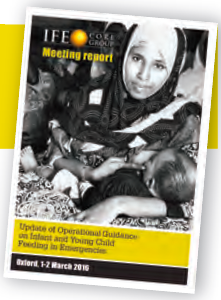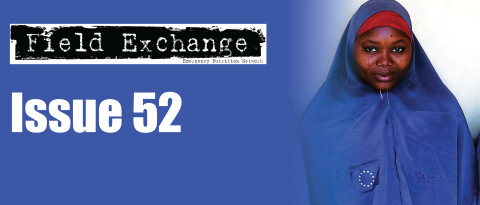Update on guidance on infant and young child feeding in emergencies underway
 The Infant and Young Child Feeding in Emergencies (IFE) Core Group is an established collaborative effort that develops guidance and resource material, documents lessons learned and builds aspects of capacity on IFE. Current members include United Nations agencies, international non-governmental organisations (NGOs), networks and expert individuals, coordinated by ENN.
The Infant and Young Child Feeding in Emergencies (IFE) Core Group is an established collaborative effort that develops guidance and resource material, documents lessons learned and builds aspects of capacity on IFE. Current members include United Nations agencies, international non-governmental organisations (NGOs), networks and expert individuals, coordinated by ENN.
In 2001, the IFE Core Group developed the Operational Guidance on infant and young child feeding in emergencies (OGIFE), a key policy guidance on the feeding-related needs of breastfed and non-breastfed infants and young children in difficult contexts. Endorsed in a 2010 World Health Assembly Resolution (WHA23.23), it has positively influenced agency policies, guidance, training materials and humanitarian action (it is the basis of Infant and Young Child Feeding Sphere Standards (2011)). Its content is informed by research, normative guidance and programme experiences and challenges.
The current version of the OGIFE was produced in 2007 (an addendum update was added in 2010). Since then, there have been significant developments in technical guidance (e.g. HIV and infant feeding), the humanitarian architecture (e.g. evolution of the cluster approach) and new experiences and lessons from emergency responses. While the core principles and provisions of the guidance remain valid, the need to update the IFE-OG has become clear. An update is now underway by the IFE Core Group, co-led by ENN and UNICEF and funded by OFDA. An IFE Core Group meeting in February 2016 established editorial and review process and agreed topics for update that include addressing the needs of non-breastfed and breast-milk-substitute (BMS) dependent infants at scale; meeting complementary feeding needs in high burden contexts; multi-sectoral roles and responsibilities; HIV; and infant feeding considerations in infectious disease outbreaks. Contributions and reviews will be invited across sectors, subject experts and country-based practitioners. The new version should be available by the end of 2016.
If you would like to contribute your experiences of using the OGIFE, please contact Marie McGrath.
The current OGIFE is available in 14 languages; we welcome offers of support to translate the new version. For more information on the IFE Core Group, visit here.


